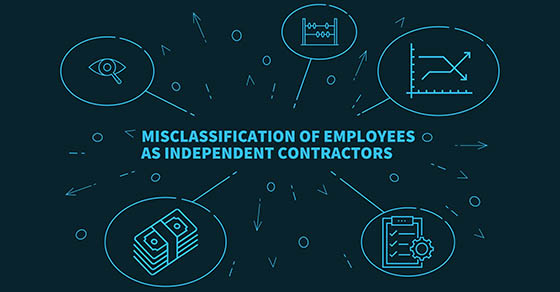Independent contractors can serve as a valuable resource and as a potential cost savings measure, especially in these times of staff shortages and inflationary pressures. If you use independent contractors though, be careful that these workers are properly classified for federal tax purposes.
If the IRS reclassifies them as employees, it can be an expensive mistake.

The question of whether a worker is an independent contractor or an employee for federal income and employment tax purposes is a complex one. If a worker is an employee, your company must withhold federal income and payroll taxes and pay the employer’s share of FICA taxes on the wages, plus FUTA tax. A business may also provide the worker with fringe benefits if it makes them available to other employees. In addition, there may be state tax obligations.
On the other hand, if a worker is an independent contractor, these obligations do not apply. In that case, the business simply sends the contractor a Form 1099-NEC for the year showing the amount paid (if it is $600 or more).
No one definition
Who is an “employee?” Unfortunately, there is no uniform definition of the term.
The IRS and courts have generally ruled that individuals are employees if the organization they work for has the right to control and direct them in the jobs they are performing. Otherwise, the individuals are generally independent contractors. But other factors are also taken into account including who provides tools and who pays expenses.
Some employers that have misclassified workers as independent contractors may get some relief from employment tax liabilities under Section 530. This protection generally applies only if an employer meets certain requirements. For example, the employer must file all federal returns consistent with its treatment of a worker as a contractor and it must treat all similarly situated workers as contractors.
Note: Section 530 does not apply to certain types of workers.
You can ask the IRS but think twice
Be aware that you can ask the IRS (on Form SS-8) to rule on whether a worker is an independent contractor or employee. However, you should also be aware that the IRS has a history of classifying workers as employees rather than independent contractors.
Businesses should consult with us before filing Form SS-8 because it may alert the IRS that your business has worker classification issues — and it may unintentionally trigger an employment tax audit.
It may be better to properly set up a relationship with workers to treat them as independent contractors so that your business complies with the tax rules.
Workers who want an official determination of their status can also file Form SS-8. Dissatisfied independent contractors may do so because they feel entitled to employee benefits and want to eliminate their self-employment tax liabilities.
If a worker files Form SS-8, the IRS will notify the business with a letter. It identifies the worker and includes a blank Form SS-8. The business is asked to complete and return the form to the IRS, which will render a classification decision.
While these are the basic tax rules the application process of the rules can get complicated quickly. Contact your Rudler, PSC advisor for advice on how to classify workers at your business at 859-331-1717. We can help make sure that your workers are properly classified, and you are protected.
RUDLER, PSC CPAs and Business Advisors
This week's Rudler Review is presented by Becca Thorman, CPA, CVA and Evan Kandra, CPA.
If you would like to discuss your particular situation, contact Becca or Evan at 859-331-1717.


As part of Rudler, PSC's commitment to true proactive client partnerships, we have encouraged our professionals to specialize in their areas of interest, providing clients with specialized knowledge and strategic relationships. Be sure to receive future Rudler Reviews for advice from our experts, sign up today !